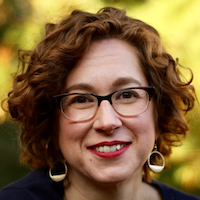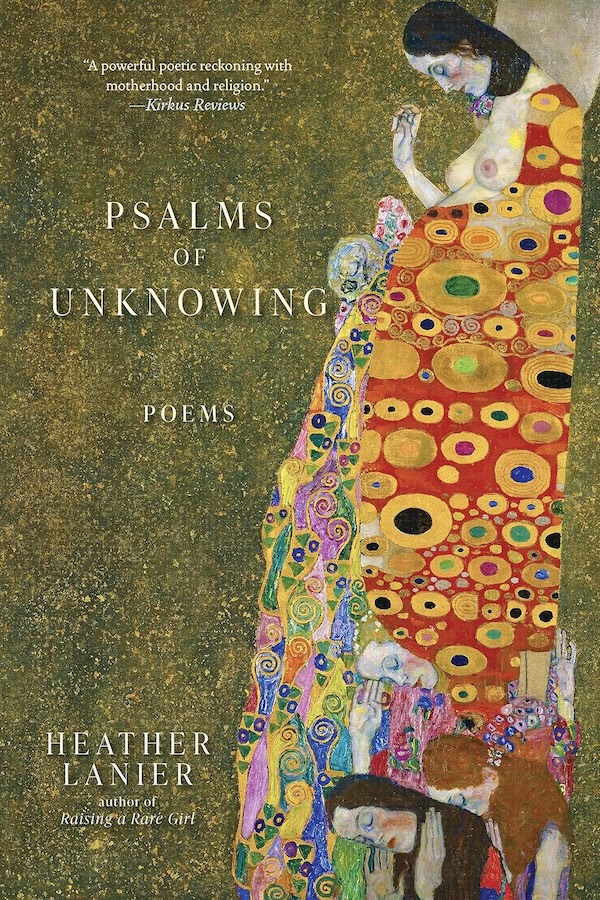
Today’s post is by author Heather Lanier.
The problem was Jesus. He kept appearing in my poems. And not even in the way typical fans of Jesus would like. He was peculiar: silently doodling in sand, or teetering with endearing doubt, or kind-of sexy in chiseled statue-form, suspended on a human-sized cross. Christians would not dig some of this. Nor (I assumed) would the literary poetry world, whose faith tolerance is limited.
As I tried to assemble a decade of my published poems into a book-length manuscript, I found other issues: Eve, remembering how much she loved going naked. Mary, of all people, pregnant and worrying about carting God-in-human-form above her pelvis. And sweet Lord, I even sometimes used the word God—that abyss-deep noun we pretend we all agree on the definition of.
This was why, when I first spread the dozens of poems across my office floor and tried to assemble them into a book, I thought: I need to bury the Jesus poems. And the overtly religious poems. I need to hide them behind the poems about misogyny and motherhood and pandemic politics and grief.
It was a classic move: Believe what you have to say isn’t worthwhile. Hide it. Try to turn yourself into another kind of writer.
I’m a professor in a graduate writing program at a state university in New Jersey. By year’s end, my students must write a 30,000-word manuscript. For many, it’s the longest project they’ve ever attempted. Almost none of them are writing about religion, and yet many still fall into this same trap as I did—thinking they should become a different kind of writer. They’re poets, but they suspect nobody reads poetry, so they try a novel instead. That’s what real writers do, right? They think. Or they’ve got an important personal story to tell, but they fear the earthquake their words could cause in the tectonic plates of their lives, so they decide to write … a fantasy sci-fi novel instead. Or they want to write a fantasy sci-fi novel, but someone in their family dismisses the entire genre, so they embark on some heady nonfiction project about narrative theory.
There are as many variations on this theme as there are writers. About a month into the fall semester, each usually returns to their callings, however scary. The poet realizes she has no interest in plot. The sci-fi-attempter discovers that, even on an invented planet, he can’t escape himself. The person longing to write sci-fi can’t say no to the strange world in her mind.
At the end of the year, I read reflection after reflection about writers trying to run away from their true subjects. About how much time they wasted doing this. About how scared they were of what they had to say. And about how, eventually, they came home to themselves.
You’d think, as a professor of writing, I would have caught myself immediately. You’d think I would have been able to identify the trapdoor before stepping into it. Instead, I thought I was being savvy. Bury the poems about faith!
Alas, I suspect every writer is prone, at one time or another, to the new shapes this trapdoor takes, the surprising ways it can appear in the house of our psyches.
And so, I tried to bury the Jesus poems. This wasn’t particularly hard. Motherhood is another heavy theme of mine. (Ah yes, another subject the literary world has a history of heralding without caveats or condescension—and yes, if we agreed on a sarcasm font, I’d be using it right now.) So, pregnancy kicked off the collection—so much pregnancy poetry, in fact, that the manuscript felt like it would keel over from the weight of a disproportionately ginormous belly.
Then came the babies, along with a second section on motherhood. Section three is where I stuck Christ and Mary, et. al. But then I tied it all up with a globally impactful fourth section on political issues—you know, important public stuff. “Masculine” stuff.
Do you see the other trapdoor here? It’s a particularly gendered one, architected from a woman having to contend with misogynistic readings of her work as drivel because it finds revelation in the domestic, in the private. (Memory: a male chair of a hiring committee tells me in an interview that all the good nonfiction is not memoir but researched writing, about things like war. I was writing a memoir. I did not get the job.) By ending the collection on this “public” material, I was attempting another kind of running from the self.
The problem, of course, is that the book didn’t work. It turns out that it never works to run from ourselves—not in regular life, and not in art-making, either. (I don’t know whether to be relieved about this or dismayed.) You know how I knew I was in trouble? The manuscript couldn’t find its title. This meant I didn’t know what was binding the thing together. Which meant a reader wouldn’t either.
I like to think all our good ideas come from our inner wisdom—that faithful compass inside each of us. Weirdly, the way I got out of my rut came, of all places, from Facebook. It came when I saw a call from an editor seeking literary manuscripts specifically about spirituality. Poetry, novels, essay collections—Anne McGrath at Monkfish Publishing was open to any genre. And any religion. She just wanted work that was both literary and spiritually curious.
I finally asked a question every artist probably needs to consider at some point in their lives: What if the thing I’m trying to bury is the thing that needs to come forward?
I spread the poems out across the office floor again. I thought about what a book would look like if the collection began with religious wrestling. What if my shaky faith and ongoing doubt and incessant yearning for the Divine appeared as a thread, stitched throughout, rather than a hard-to-digest middle chunk?
Something weird happened. The collection started to cohere. Poems about the wildness of being pregnant got bigger beside my speculation about Mary’s pregnancy. My grief over a family member’s murder was more powerful next to my floundering attempts at prayer. My rage about the absence of women in images got more interesting when placed near a poem about Jesus stopping an angry mob from stoning a woman. I still created four sections, and the poems are unmistakably from a feminist mother’s perspective. But the whole collection begins—and ends—with spiritual seeking.
We sometimes think of poetry as dismissing of audience, as privileging the writer’s intentions over the reader’s presence. It was the presence of an actual audience, this time in the form of an independent publisher, that helped me conceive of my collection. I arranged and rearranged it. I called it Psalms of Unknowing. I sent it to Monkfish. One month later, they accepted it.
Maybe it will always be our plight, as writers, to try to turn ourselves into other kinds of writers. The versions of this trapdoor are numerous, as newly constructed as any piece of art we try to make. But our ways of getting out of them are equally varied: an intuitive voice, a smart response from a friend, even a post on Facebook.

Heather Lanier’s poetry collection, Psalms of Unknowing, was called “a powerful poetic reckoning with motherhood and religion” by Kirkus Reviews. Her memoir, Raising a Rare Girl (Penguin Press 2020) was a New York Times Book Review Editors’ Choice. For more of her essays on writing and life, sign up for her free Substack, The Slow Take.


Thank you for this. It was the reminder I needed to continue my messy story.
Heather! I love this post. I love this book, with its “shaky faith and ongoing doubt and incessant yearning for the Divine” and its brilliantly conceived cover art! I am going to order it as soon as I close this post.
Now from a writer’s perspective: I love this reminder to stay true to my own story and voice. I am deep into a memoir guided by that inner knowing. This is the book I have to write. Yet…I find myself swayed by what other people are doing, what other people might think, what writing classes and experts say about story arc, etc. I’ve learned so much from those lesson here on Jane’s site and other places! They have shaped me into a better writer and it shows in my manuscript.
But the final story is mine. The beauty and the grace in what I have to say comes from staying close to my own inner knowing…That is where true power resides. Thank you for speaking to this so beautifully, right at the moment I need to hear it most.
This was EXCEPTIONAL, and hit me right in the heart. I’ve been dealing with this without knowing it. Thank you so much for sharing.
At some point when I was studying and writing poetry, my first love and my natural and intuitive way of expression and loving learning the craft, I got the notion that poetry was less than — less than fiction, and if you couldn’t write fiction, you weren’t a real writer. I don’t know much about writing fiction, though I’m picking it up through ravenous reading like On Earth We’re Briefly Gorgeous, while also watching plot, character, landscape, arcs, etc. develop. So I’ve stopped writing, except for a tiny bit of memoir I’ve been exploring, playing with. What struck me from this post is how we run from ourselves and run from our stories that want to be told in whatever form they may be best expressed by *this* writer. I’ve run from myself so much so that I bought a Mustang I couldn’t afford, took a job at Safeway to repay the loan on it, sleep five hours a night, and eat junk food. My health won’t let me keep this up for long. I have an independent income and don’t really need to work. Now that’s running. I feel robotic, very limited sense of joy. I have hard decisions to make, about selfcare. I only hope I’ll have the courage to make them, as selfcare was never taught in my family, to say the least.
Anyway, this post — I burst into tears of recognition. Love how the Universe sends you what you need to know, if you show up in at least some tiny way and that it meets you where you are. Much appreciated.
Thank you so much for this wonderful piece! I have shied away from poems and essays including or dealing with faith as well, yet my faith is integral to my life and perspectives. When we are finding we don’t have things to say, it might be because we are not listening to our own hearts.
What a great message told in a wonderful voice–I’ve signed up for the Substack to get more of this relatable wisdom.
Thank you for this. Seriously. From the bottom of my heart. Whether the topic is faith or whatever we’re avoiding… your wonderful piece is a reminder to be true to ourselves as writers and creators.
Thank you for this post! And thank you (to you and to Monkfish) for putting Psalms of Unknowing into the world. We are a brighter, richer place with these poems tucked close to our hearts.
Thank you, Heather, for sharing this vulnerability–and how it was overcome! It was just what I needed today.
Thank you, Heather! In this day it is courageous to write about our faith. With the times we are in, we need more writing courage. And I needed the encouragement.
Beautifully said and aptly timed.